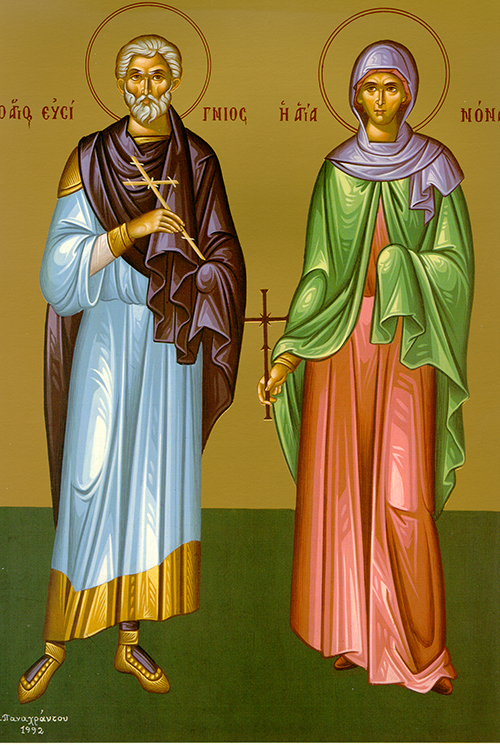

The holy martyr Eusignius was a soldier under emperors Maximian, Constantine, and Constantine’s sons. Having spent sixty years in military service, he withdrew and went home to Antioch, where he lived a life of good works, prayer, and fasting. In the year 362, during the time of the emperor Julian the Apostate, he was arrested and beheaded.
Let us go forth to welcome the Transfiguration of Christ; let the faithful joyfully anticipate the feast and exclaim: the day of divine gladness has arrived; the Lord ascends Mount Tabor and the beauty of His divinity flashes like lightning.
Your martyr Eusignius, O Lord our God, in his struggle received an incorruptible crown from You. With Your strength, he brought down the tyrants and broke the cowardly valor of demons. Through his prayers, O Christ our God, save our souls.
Today all mortal nature radiates divinity at the divine Transfiguration and cries out with gladness: Christ is transfigured, saving all.
Let us praise Eusignius the martyr who conquered evil by the power of Christ. He clearly proclaimed his faith and was subjected to vicious torments. But he vanquished the harshness of the torturer and received a victor’s crown from God Himself.
1 Corinthians 12: 12-26
Brothers and sisters: The body is one and has many members, but all the members, many though they are, are one body; and so it is with Christ. It was in one Spirit that all of us, whether Jew or Greek, slave or free, were baptized into one body. All of us have been given to drink of the one Spirit. Now the body is not one member, it is many. If the foot should say, “Because I am not the hand I do not belong to the body,” would it then no longer belong to the body? If the ear should say, “Because I am not an eye I do not belong to the body,” would it no longer belong to the body? If the body were all eye, what would happen to our hearing? If it were all ear, what would happen to our smelling? As it is, God has set each member of the body in the place he wanted it to be. If all the members were alike, where would the body be? There are, indeed, many different members, but one body. The eye cannot say to the hand, “I do not need you,” any more than the head can say to the feet, “I do not need you.” Even those members of the body which seem less important are in fact indispensable. We honor the members we consider less honorable by clothing them with greater care, thus bestowing on the less presentable a propriety which the more presentable already have. God has so constructed the body as to give greater honor to the lowly members, that there be no dissension in the body, but that all the members may be concerned for one another. If one member suffers, all the members suffer with it; if one member is honored, all the members share its joy.
Matthew 18: 18-22; 19:1-2, 13-15
The Lord said to his disciples: “I assure you, whatever you declare bound on earth shall be held bound in heaven, and whatever you declare loosed on earth shall be held loose in heaven. Again I tell you, if two of you join your voices on earth to pray for anything whatever, it shall be granted you by my Father in heaven. Where two or three are gathered in my name, there am I in their midst.”
Then Peter came up and asked him, “Lord, when my brother wrongs me, how often must I forgive him? Seven times?” “No,” Jesus replied, “not seven times; I say, seventy times seven times.”
When Jesus had finished this discourse, he left Galilee and came to the district of Judea across the Jordan. Great crowds followed him and he cured them there.
At one point, children were brought to him so that he could place his hands on them in prayer. The disciples began to scold them, but Jesus said, “Let the children come to me. Do not hinder them. The kingdom of God belongs to such as these.” And he laid his hands on their heads before he left that place.
Icon courtesy of Jack Figel, Eastern Christian Publications – ecpubs.com
Monday, August 4 –